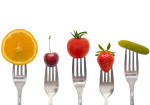Group: Specific Diets & Nutrition
Created: 2012/01/01,
Members: 104,
Messages: 22775
With so many diets and nutritional plans out there, you can get lost. Find out what works best for others and share your experiences!
Join group
Watermelon

kdj997
Posts:
4
Joined: 2005/09/03  |
2005/09/03, 01:02 PM
I have insane sugar cravings but I found watermelon helps me fight them. I guess my question is should I be worried about watermelon having a negative effect on fatloss and toning up? I know it mist be packed with sugar but fat free and high in fiber but I'm not sure about the rest of the nutritional information.
|
|
| |

mikencharleston
Posts:
1,585
Joined: 2002/01/09  |
2005/09/03, 04:29 PM
Here's a bit of info on them: :)
Sweet, juicy watermelon is actually packed with some of the most important antioxidants in nature. Watermelon is an excellent source of vitamin C and a very good source of vitamin A, notably through its concentration of beta-carotene. Pink watermelon is also a source of the potent carotenoid antioxidant, lycopene. These powerful antioxidants travel through the body neutralizing free radicals. Free radicals are substances in the body that can cause a great deal of damage. They are able to oxidize cholesterol, making it stick to blood vessel walls, where it can lead to heart attack or stroke. They can add to the severity of asthma attacks by causing airways to clamp down and close. They can increase the inflammation that occurs in osteoarthritis and rheumatoid arthritis and cause most of the joint damage that occurs in these conditions, and they can damage cells lining the colon, turning them into cancer cells. Fortunately, vitamin C and beta-carotene are very good at getting rid of these harmful molecules and can therefore prevent the damage they would otherwise cause. As a matter of fact, high intakes of vitamin C and beta-carotene have been shown in a number of scientific studies to reduce the risk of heart disease, reduce the airway spasm that occurs in asthma, reduce the risk of colon cancer, and alleviate some of the symptoms of osteoarthritis and rheumatoid arthritis. A cup of watermelon provides 24.3% of the daily value for vitamin C, and, through its beta-carotene, 11.1% of the DV for vitamin A. Watermelon is rich in the B vitamins necessary for energy production. Our food ranking system also qualified watermelon as a very good source of vitamin B6 and a good source of vitamin B1, magnesium, and potassium. Part of this high ranking was due to the higher nutrient density of watermelon. Because this food has a higher water content and lower calorie content than many other fruits (a whole cup of watermelon contains only 48 calories), it delivers more nutrients per calorie - an outstanding health benefit! Watermelon is also a very concentrated source of the carotenoid, lycopene. Well known for being abundant in tomatoes and particularly well absorbed from cooked tomato products containing a little fat such as olive oil, lycopene is also present in high amounts in watermelon and mangoes. Lycopene has been extensively studied for its antioxidant and cancer-preventing properties. In contrast to many other food phytonutrients, whose effects have only been studied in animals, lycopene has been repeatedly studied in humans and found to be protective against a growing list of cancers. These cancers now include prostate cancer, breast cancer, endometrial cancer, lung cancer and colorectal cancers. A study published in the November 2003 issue of the American Journal of Clinical Nutrition found that in patients with colorectal adenomas, a type of polyp that is the precursor for most colorectal cancers, blood levels of lycopene were 35% lower compared to study subjects with no polyps. Blood levels of beta-carotene also tended to be 25.5% lower, although according to researchers, this difference was not significant. In their final (multiple logistic regression) analysis, only low levels of plasma lycopene (less than 70 microgram per liter) and smoking increased the likelihood of colorectal adenomas, but the increase in risk was quite substantial: low levels of lycopene increased risk by 230% and smoking by 302%.(December 31, 2003) The antioxidant function of lycopene – its ability to help protect cells and other structures in the body from oxygen damage – has been linked in human research to prevention of heart disease. Protection of DNA (our genetic material) inside of white blood cells has also been shown to be an antioxidant role of lycopene. Protection against Macular Degeneration Your mother may have told you carrots would keep your eyes bright as a child, but as an adult, it looks like fruit is even more important for keeping your sight. Data reported in a study published in the June 2004 issue of the Archives of Opthamology indicates that eating 3 or more servings of fruit per day may lower your risk of age-related macular degeneration (ARMD), the primary cause of vision loss in older adults, by 36%, compared to persons who consume less than 1.5 servings of fruit daily. In this study, which involved 77,562 women and 40,866 men, researchers evaluated the effect of study participants' consumption of fruits; vegetables; the antioxidant vitamins A, C, and E; and carotenoids on the development of early ARMD or neovascular ARM, a more severe form of the illness associated with vision loss. Food intake information was collected periodically for up to 18 years for women and 12 years for men. While, surprisingly, intakes of vegetables, antioxidant vitamins and carotenoids were not strongly related to incidence of either form of ARM, fruit intake was definitely protective against the severe form of this vision-destroying disease. Three servings of fruit may sound like a lot to eat each day, but watermelon can help you reach this goal. :):) -------------- Mike in Pensacola Now. |

kdj997
Posts:
4
Joined: 2005/09/03  |
2005/09/04, 08:25 PM
Wow, I had no idea it could be that beneficial. thanks for the information.
|
